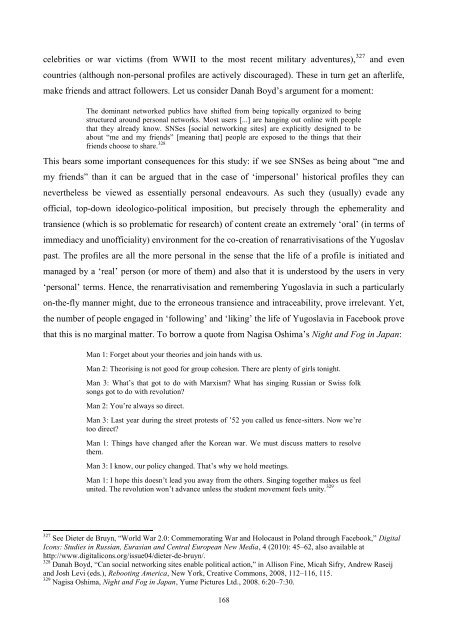UNIVERSITY OF NOVA GORICA GRADUATE SCHOOL ...
UNIVERSITY OF NOVA GORICA GRADUATE SCHOOL ...
UNIVERSITY OF NOVA GORICA GRADUATE SCHOOL ...
Create successful ePaper yourself
Turn your PDF publications into a flip-book with our unique Google optimized e-Paper software.
celebrities or war victims (from WWII to the most recent military adventures), 327<br />
and even<br />
countries (although non-personal profiles are actively discouraged). These in turn get an afterlife,<br />
make friends and attract followers. Let us consider Danah Boyd‘s argument for a moment:<br />
The dominant networked publics have shifted from being topically organized to being<br />
structured around personal networks. Most users [...] are hanging out online with people<br />
that they already know. SNSes [social networking sites] are explicitly designed to be<br />
about ―me and my friends‖ [meaning that] people are exposed to the things that their<br />
friends choose to share. 328<br />
This bears some important consequences for this study: if we see SNSes as being about ―me and<br />
my friends‖ than it can be argued that in the case of ‗impersonal‘ historical profiles they can<br />
nevertheless be viewed as essentially personal endeavours. As such they (usually) evade any<br />
official, top-down ideologico-political imposition, but precisely through the ephemerality and<br />
transience (which is so problematic for research) of content create an extremely ‗oral‘ (in terms of<br />
immediacy and unofficiality) environment for the co-creation of renarrativisations of the Yugoslav<br />
past. The profiles are all the more personal in the sense that the life of a profile is initiated and<br />
managed by a ‗real‘ person (or more of them) and also that it is understood by the users in very<br />
‗personal‘ terms. Hence, the renarrativisation and remembering Yugoslavia in such a particularly<br />
on-the-fly manner might, due to the erroneous transience and intraceability, prove irrelevant. Yet,<br />
the number of people engaged in ‗following‘ and ‗liking‘ the life of Yugoslavia in Facebook prove<br />
that this is no marginal matter. To borrow a quote from Nagisa Oshima‘s Night and Fog in Japan:<br />
Man 1: Forget about your theories and join hands with us.<br />
Man 2: Theorising is not good for group cohesion. There are plenty of girls tonight.<br />
Man 3: What‘s that got to do with Marxism? What has singing Russian or Swiss folk<br />
songs got to do with revolution?<br />
Man 2: You‘re always so direct.<br />
Man 3: Last year during the street protests of ‘52 you called us fence-sitters. Now we‘re<br />
too direct?<br />
Man 1: Things have changed after the Korean war. We must discuss matters to resolve<br />
them.<br />
Man 3: I know, our policy changed. That‘s why we hold meetings.<br />
Man 1: I hope this doesn‘t lead you away from the others. Singing together makes us feel<br />
united. The revolution won‘t advance unless the student movement feels unity. 329<br />
327 See Dieter de Bruyn, ―World War 2.0: Commemorating War and Holocaust in Poland through Facebook,‖ Digital<br />
Icons: Studies in Russian, Eurasian and Central European New Media, 4 (2010): 45–62, also available at<br />
http://www.digitalicons.org/issue04/dieter-de-bruyn/.<br />
328 Danah Boyd, ―Can social networking sites enable political action,‖ in Allison Fine, Micah Sifry, Andrew Raseij<br />
and Josh Levi (eds.), Rebooting America, New York, Creative Commons, 2008, 112–116, 115.<br />
329 Nagisa Oshima, Night and Fog in Japan, Yume Pictures Ltd., 2008. 6:20–7:30.<br />
168

















